The Clockwork Rocket Read online
Page 2
“Above them, in the trees, the arborine was watching. He had never seen creatures like this before, and it filled him with rage to see them come into his garden and steal his food.
“Amata and Amato gathered all the seeds they could hope to carry, but they were weak from their journey so they decided to rest before setting back for the farm. They hollowed out spaces in the soil and lay down to sleep.
“Like the flowers around him, the arborine never slept, so for a long time he didn’t understand the intruders’ condition. But when he finally realized that they were blind to the world, he crawled onto a branch above them and reached down to wrap his arms around Amata.
“In his anger, though, he’d misjudged his strength; lifting her up wasn’t easy. Amata was halfway into the trees when she woke, and the arborine’s grip faltered. She fought him and broke free, falling to the ground.
“When she hit the ground she was too stunned to move, but she called out to her co to flee. He rose to his feet and began to run, but the arborine was faster, darting from branch to branch above him. When Amato tripped on the root of a tree, the arborine reached down and took him. Unlike Amata, the boy was light enough to lift… and small enough to swallow.”
Dario hesitated. “It’s not too frightening for you?” he asked.
Yalda was squirming inside at the scene he’d described, but she suspected that Dario was merely making fun of Vito’s qualms. She gazed down at him as calmly as she could and replied, “Not at all. Please go on.”
“Amata was mad with grief,” Dario continued, “but there was nothing she could do. She ran through the forest, trying to imagine what she would tell her father. He had lost his sight to save their lives; this news would kill him.
“Then Amata’s way was blocked by a fallen branch, and an idea came to her. She smashed two rocks together until she had a shard sharp enough to cut the wood. And she carved the branch into the shape of Amato.
“When she reached the farm, she dropped all the seeds she’d gathered on the ground in front of her father, and he rejoiced at the sound. Then she told him, ‘Amato is sick from his travels; as you lost your sight, he has lost the power of speech. But in time, with rest and food, you will both recover.’
“Azelio was filled with sadness, but when he touched his son’s shoulders the boy still felt strong, so he tried to stay hopeful.
“In the days that followed, they feasted on half the seed, and Azelio took Amata’s word that both his children were sated before he ate. Amata planted the rest of the seed in their fields, and it began to grow. With her strength restored, she managed to gather more food from the edge of the forest, and the two of them saw out the famine.
“Azelio’s sight did not return, but he was reconciled to that. What he could not accept was Amato’s unbroken silence.
“The years passed, and finally Azelio said, ‘It’s time I had grandchildren.’ In the hope of provoking a response from his son he added, ‘Do you have the power to make that happen, Amato, or will your co have to do everything herself?’
“Of course there was no reply, and Amata didn’t know how she could keep hiding the truth from her father.
“For twelve days, Amata worked hard to fill every store-hole with food, until there was enough put away for her father to survive for a year. Then, while he was sleeping, she walked away from the farm. She had decided to live in the forest, alone, and only return in secret to replenish the stores.”
Yalda couldn’t help herself now; her whole body shivered with anguish. It wasn’t Amata’s fault that her co had died. What was happening to her was so unfair.
“One night in the forest,” Dario continued, “Amata looked up into the trees and saw the arborine darting from branch to branch. She had grown into a powerful woman, and the fearsome creature that had taken her co looked much more weak and vulnerable now.
“Day and night she watched the arborine, studying its ways. The arborine watched her too, but when it saw that she was doing nothing to take revenge, it grew complacent.
“After a while, Amata made a plan. She dug a nest in the ground, and filled it with four small, carved wooden figures. Then she hid beside the nest and waited.
“When the arborine saw the nest and what it thought were Amata’s children, it couldn’t help itself: it reached down to grab one and take it up into the trees. But Amata had bound the figures to heavy rocks beneath the soil, and covered them with sticky resin. The arborine was trapped, pinned against a branch of the tree by its own two arms that stretched down to the ground.
“Amata climbed up into the tree, and with the shard of stone she’d used to carve the wood, she sliced the arborine’s arms off. As it tried to grow more limbs to fight her, she leaped on it, spread her mouth wide, and swallowed it whole, just as it had swallowed her co.
“When she jumped back to the ground, Amata felt sick, but she forced herself to keep the arborine inside her. She lay down and tried to sleep, but her body was racked by fevers and trembling. After a time, she lost control of her shape: flesh was flowing this way and that, with strange new limbs growing and retreating before her eyes. Amata was sure that the arborine was fighting her from within, so she found the shard again and prepared to cut off its head as soon as it showed itself.
“Sure enough, a head budded from her chest, and its four eyes opened. Amata raised the shard and began to bring it down, but then a voice said, ‘Don’t you recognize me?’ The head was Amato’s; he had survived inside the arborine all this time, waiting to grow strong enough to fight his way out.
“Amata calmed herself, gathered all her strength, and pushed the flesh of her co to one side of her body until nothing joined them but a narrow tube of skin, thinner than a finger. Then she brought down the shard and severed it, setting Amato free.
“They walked out of the forest and back to the farm, where they told Azelio the truth of what had happened. He rejoiced at the sound of his son’s voice, and forgave his daughter for deceiving him.
“In time, Azelio was blessed with four grandchildren, and though he never regained his sight he did all he could to help raise them, and in turn they gave him ease and comfort in his old age.”
As Dario fell silent, Yalda struggled to compose herself. She couldn’t stop her passenger feeling the unsteadiness in her gait, but she still had a chance to appear impassive to her father, to show him that she could take this gut-wrenching tale in her stride.
The story hadn’t left her fearful of their destination; she was prepared to be vigilant in the forest, but even if there were arborines still living there a creature that struggled to lift an ordinary girl would have no hope of abducting the giant lump.
What unsettled her more was the question: What if Amato hadn’t been rescued? What if Amata had remained alone? In the story there’d been a magical way to fix everything, but Yalda couldn’t help wondering: how would Amata have lived her life, if her co had been truly, irrevocably dead?
Late in the afternoon they came across two young farmers, Bruna and Bruno, heading into the village. Though no one in the family had met them before, after chatting for a while Dario discovered that he’d known their grandfather’s brother. Yalda didn’t envy them their long trip; it was one thing to walk this far as an occasional adventure, but to fetch routine supplies it would soon become tedious. If there’d been a truck running the length of the road every few days, from the village to the forest and back, everyone’s life would have been simpler. But the trucks only came out here to collect the harvest.
They stopped to eat again just before sunset. The wheat fields still stretched out around them as far as Yalda could see, but the road they’d been following since the start of their journey had begun to meander slightly, and its surface had grown uneven. It was enough to puncture the numbing sense of repetition Yalda had felt when they’d first set out, but it was as hard as ever to believe that the fields would come to an end, and that they really were heading out into the wilderness.
; “It’s not too much farther,” Vito promised. “We could stop and sleep here, but that would cost us a night in the forest.” Yalda understood: the whole point was to give Dario the benefit of the wild plants’ light, so delaying their arrival until morning would be a terrible waste.
When they took to the road again Dario soon dozed off. Once Yalda had convinced herself that he was holding onto her securely, she lifted her rear gaze to watch the stars come out. The trails of light that emerged were like multicolored worms struggling across the deepening blackness—though they appeared to be struggling in vain, swept across the sky in a slow whirl but coming no closer to their destinations.
“If the stars are so far away,” she said, “that the red light reaches us after the violet… why do their trails all point in different directions?”
“Because they’re moving in different directions,” Vito replied.
“But they’re not!” Yalda protested. “They’re all rising in the east and setting in the west.”
“Ah.” Vito managed to sound both amused and pleased—as if her question was foolish, but welcome nonetheless. “When the stars rise and set, that’s the world turning, not the motion of the stars themselves.”
“I know.” He had explained the turning of the world to her before, and Yalda hadn’t forgotten. “But what’s the difference? If the violet light reaches us first… and the world turns while we’re waiting for the red light to catch up… shouldn’t that spread the colors across the sky?”
Vito said, “I think you’ve answered your own question. You can see that the trails aren’t lined up east to west.”
“Then I don’t understood anything,” Yalda declared forlornly.
Vito buzzed gentle mockery at her melodramatic verdict. “You understand a lot,” he said. “You just have to think things through a bit more carefully.”
Encouraged, Yalda searched the sky for more clues, but instead of receiving any revelatory insight she merely recalled another source of puzzlement. “The sun has no trail,” she complained.
“Exactly!” Vito replied. “It can’t be the turning of the world that makes the trails, or the sun would have one too.”
Yalda closed her rear eyes and tried to picture what was happening. Never mind the stars; if red light was so sluggish, how could the sun cross the sky without leaving a smudge of red in its wake, forever lagging behind the swifter greens and blues? “Doctor Livia said sunlight is too blue. So does it have no red or green in it at all?”
“No, it has them,” Vito insisted. “Blue is strongest in sunlight, but it has about as much of the other colors as the stars do.”
“Hmm.” Yalda imagined the sun as a blazing blue-white disk, and the world as a cool, gray circle off to one side, slowly turning. “Light flies out from the sun, with two colors, red and violet, starting the journey side by side. But as surely as Lucia will beat Lucio in a race, the violet light will strike home first—and then the world will turn a little, moving the sun across the sky before the red light arrives. So why aren’t the colors spread out?”
Vito said, “You just described a single flash of light leaving the sun. But the sun doesn’t flash, does it? It’s always shining.”
Yalda was bursting out of her skin with frustration. “Then how does it work? How does it make sense?”
Vito said, “Pick a star trail, and tell me exactly what you see.”
Yalda opened her rear eyes and complied, forcing herself to speak calmly. “I see a faint line of light. It’s violet at one end, then along its length it changes to blue, then green, then yellow, then red.”
“And are you seeing these colors at different times,” Vito pressed her, “or are you seeing them all at once?”
“All at once. Oh!” Her father’s simple question had thrown her old mental image into disarray. She’d been picturing red and violet light arriving at different times, but apart from reasoning that the sun would move across the sky in the interim, she’d ignored the timing completely, blurring the two events into something she expected to see in the same instant. “I have to think about what I see at one moment,” she said, “not about the light that leaves the sun at one moment.”
“Yes,” Vito said. “Go on.”
“But how does that change things?” Yalda wondered. “If I see red light and violet light at the same time… then the slower, red light must have left the sun earlier.”
“Right. So how does that affect what you see?”
Yalda struggled to picture it. “Where the sun is in the sky depends on which way the world is facing when the light arrives, not when it left. The red light left earlier, but that makes no difference—we just see whatever reaches us at the time we’re looking. So we see all the sun’s colors in the same place, not spread out in a trail.”
Vito’s rear eyes widened with approval. “That wasn’t too difficult, was it?”
Yalda was encouraged, but still far from confident that everything made sense. “And the stars? Why are they so different?”
“The stars are really moving,” Vito reminded her. “Not just rising and setting with the turning of the world. Between the time when the red light we’re seeing now left a star, and the time when the violet light we’re seeing now followed it, the star will have moved far enough for us to see the different colors coming from different directions. When we look at the sun, the violet light and the red light follow the same road, even though the red light begins the journey earlier. When we look at a star, the violet light’s coming to us from a different place, along a different path than the red.”
Yalda turned this over in her mind. “If the stars are really moving,” she said, “then why don’t we see them move?” The colored worms were all pinned to the rigid black sky, sharing, but never exceeding, the illusory motion that came from the world’s shifting gaze. Why didn’t they advance along their own trails, wriggling out of their constellations into fresh new patterns every night?
Vito said, “The stars are moving quickly, but they’re very far away. Even with a keen eye and a perfect memory, it would take us a lifetime to notice any change. But we’re lucky, we don’t have to wait that long. Some light trails show us in a single glance what happened over many generations.”
The red light from the fields around them lit the way now. The familiar glow made Yalda sleepy, though the strength in her limbs was holding out well enough. If Dario could cling to her as he dozed, lost to the world but still disciplined enough not to slacken his grip, maybe she could close her own eyes and sleepwalk down the road. If only Vito had brought a rope to put around her shoulders and guide her steps, it might not have been a bad idea.
When she saw the lavish jumble of colors ahead, Yalda wondered if she was fully awake. Vito’s body was partly blocking her view, and the strange apparition jittered around him, revealed and hidden in turn by the rhythm of their steps and the undulations of the road.
The road came to an end. They walked across scrubland strewn with the kind of weeds and low bushes that Yalda spent most of her days uprooting. The plants’ tiny flowers shone up at her from around her feet, but the browns and yellows that, back on the farm, marked tiresome blemishes spoiling the wheat’s pure light struck her very differently now. She stepped around them gingerly, no more willing to crush them than she would have dared trample a neighbor’s crop.
The nearest trees weren’t tall, and though it was hard to be sure in the unfamiliar setting Yalda thought she’d seen their like in uncultivated corners of the farm, or lining the streets of the village. They might have been sisters to the scrub plants; their muted colors were much the same. Behind them, though, exotic giants loomed, strewn with blossoms of every hue.
Dario stirred and opened his eyes. Yalda expected him to mutter some complaint about the lengths to which they’d gone for the sake of quackery, but instead he gazed up at the lights in thoughtful silence. Perhaps he was lost in reverie, drawn back to memories of his youthful adventures with Daria.
Yalda
followed Vito into the forest. The undergrowth soon became too thick for her to avoid treading on the smaller plants, and she had no choice but to keep her soles as hard as she’d made them for the pebble-strewn road; if she’d softened her feet, as she did when she worked in the flower bed, the sharper stems would have lacerated her skin in no time.
She kept her front gaze locked to the ground, measuring every step, but after a while she grew confident enough to lift her rear eyes from her passenger toward the festooned branches above. Flowers wider than her shoulders shone up into the darkness, their violet petals draped across a network of supporting vines; she could not see their light directly, but the glow seeping through each petal’s underside was bright enough to cast shadows. Around these monsters, smaller blooms in shades of orange, green and yellow crowded every branch and twig.
When they passed through a swarm of mites, Dario shuddered and cursed; Yalda could shake off the insects herself with barely a thought, but her grandfather’s skin was not so fast to unseat them. He unwrapped two of his arms from around her torso and began to flail at the creatures, stretching the stubby fingers that had locked his hands together into broad fans better suited to sweeping the nuisance away.
As they threaded their way between the trees, the violet behemoths overhead gave way to a kind of cousin, slightly smaller, with intense green flowers sprouting from the vines that had previously been bare. Some of these faced down into the undergrowth, dazzling the travelers; others were turned toward the sky. Yalda tried to picture how the forest would appear from high above the trees, a giant’s flower bed beside the staid red wheat fields.
Vito stopped and looked around. They’d reached a small clearing where the flowers were as bright and varied as Doctor Livia could have wished, while the trees were not too closely spaced nor the undergrowth too tangled. If the forest held a better place to spend the night they could have searched until dawn before finding it.

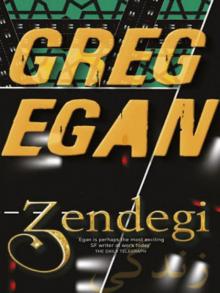 Zendegi
Zendegi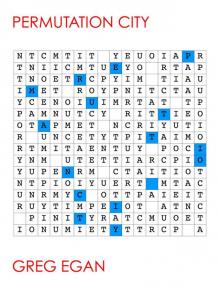 Permutation City
Permutation City The Eternal Flame
The Eternal Flame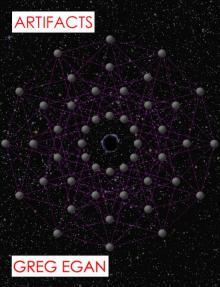 Artifacts
Artifacts Wang's Carpets
Wang's Carpets Dichronauts
Dichronauts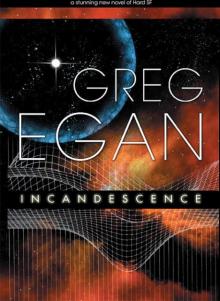 Incandescence
Incandescence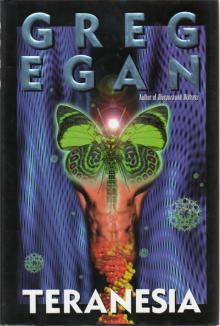 Teranesia
Teranesia Schild's Ladder
Schild's Ladder Quarantine
Quarantine The Four Thousand, the Eight Hundred
The Four Thousand, the Eight Hundred The Clockwork Rocket
The Clockwork Rocket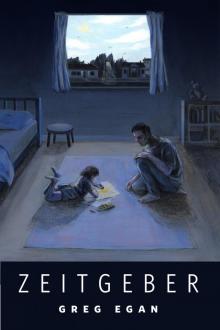 Zeitgeber
Zeitgeber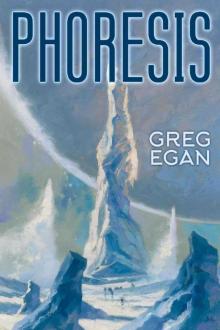 Phoresis
Phoresis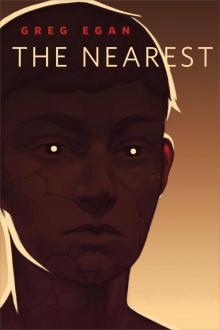 The Nearest
The Nearest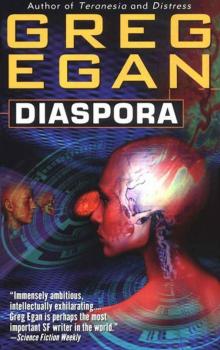 Diaspora
Diaspora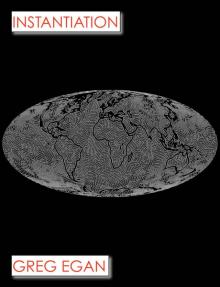 Instantiation
Instantiation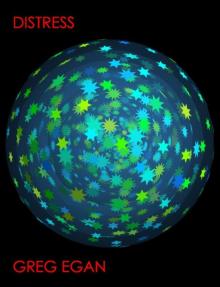 Distress
Distress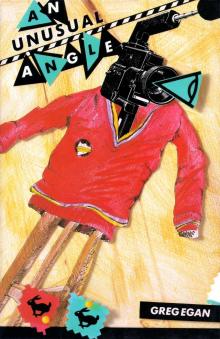 An Unusual Angle
An Unusual Angle Oceanic
Oceanic The Arrows of Time
The Arrows of Time Axiomatic
Axiomatic![Anthology 2. Luminous [1998, 2010] Read online](http://i1.bookreadfree.com/i/03/18/anthology_2_luminous_1998_2010_preview.jpg) Anthology 2. Luminous [1998, 2010]
Anthology 2. Luminous [1998, 2010]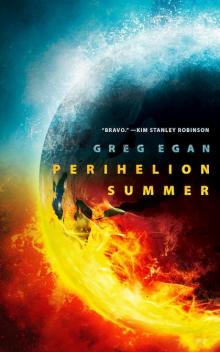 Perihelion Summer
Perihelion Summer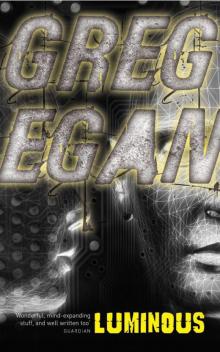 Luminous
Luminous